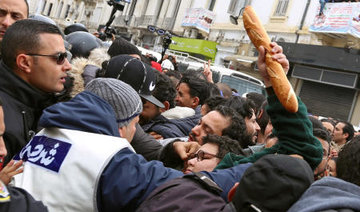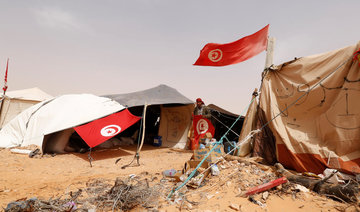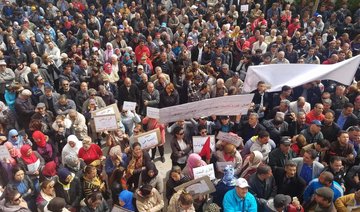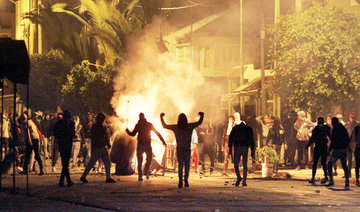SIDI BOUZID: Shouting slogans and holding up placards outside a government office in the impoverished Tunisian city of Sidi Bouzid, university graduates have a message for officials — give us jobs or you will face trouble.
They are part of the spasm of anti-government unrest that spread nationwide this week, stoking another political crisis in a nation in turmoil as austerity bites hard under pressure from foreign lenders to get Tunisia’s finances in order.
It was in Sidi Bouzid that mass protests erupted seven years ago and rapidly engulfed the rest of the North African country, sweeping away autocrat Zine El-Abidine Ben Ali in the first of the Arab Spring uprisings.
Now the young men and women who spearheaded the outbreak of unrest in Sidi Bouzid are back in the streets of the dusty, dilapidated provincial city, complaining that they never reaped the benefits promised by the 2011 revolution.
Tunisia is the only democratic success story of the 2011 uprisings, with a unity government comprising secular centrists, moderate right and independents, but — materially — most people are worse off than before.
Several deadly militant attacks have scared off much of the foreign tourism and investment critical to the economy, knocking the currency down 60 percent since 2011 and driving up inflation to a three-and-half-year high.
Disillusionment
“We had hoped that our lives would become better, that we get jobs and housing, but everything has turned for the worse,” said Bashir Hussein, one of the disgruntled graduates.
He is embarrassed that at 32 he still lives at home, unable to find a good job since graduation a decade ago — a fate shared by many in a country where unemployment among the young runs around 30 percent. “I cannot afford to marry. I don’t have hopes anymore that things will improve,” Hussein said.
He and his friends had hoped the 2011 revolution would translate into new jobs in public services, which Ben Ali had steadily expanded to buy loyalty — Tunisia’s spend on public wages is around 15 percent of GDP, one of the highest levels worldwide.
But that model has crumbled as a fall in phosphate exports due to blockages by protesters demanding jobs, as well as the decline in tourism revenue, have forced Tunisia to take on loans from the International Monetary Fund and Western countries.
Creditors want the government to stop spending almost two-thirds of the budget on public salaries and focus on education and infrastructure to create jobs over the long term.
The Sidi Bouzid protesters say authorities pledged to hire some 60 graduates from the town back in 2015 in what analysts say is a common gesture to discourage dissent. But the jobs have never transpired due to austerity-driven hiring freezes.
“We had a promise but officials have backtracked,” Hussein said. “We will keep protesting.”
The government has bowed to pressure from labor unions not to lay off civil servants, leaving no room for new hires.
To help fulfill foreign creditors’ demands to lower the deficit, the Tunis government from Jan. 1 hiked taxes and prices affecting many common items from petrol to mobile phone calls, hitting the unemployed hardest.
While protests have been smaller than in 2011, investors and Western diplomats are concerned they could still pressure the government into watering down reforms, as before, to secure social peace.
Stoking such worries, the Ennahda party, part of the governing unity coalition, has endorsed calls from labor unions to roll back some of the reforms including subsidy cuts.
“I suspect they will have to give in (at least partially) on the wage demands and postpone the hikes in prices,” said Charlie Robertson, global chief economist at Renaissance Capital.
Lack of money raises graft suspicions
Sidi Bouzid is located just 200 km inland from coastal Tunis but it takes four hours to reach the city of 300,000 people by car as there is no highway or railway service.
This forces motorists to rely on slow, pothole-ridden roads winding through village after village.
“We’ve demanded many times a link to the highway or railway so investors can come but we are told there is no money,” said Attia Athmouni, an activist who was one of the first to call for protests in Sidi Bouzid after a young street vendor immolated himself when bribe-seeking police confiscated his fruit cart.
“The money is there. It is just not distributed to the people because we still have corruption,” he said, pointing to crumbling housing as evidence of what he called graft siphoning off funds needed to invest in infrastructure.
Government officials deny such accusations and say Prime Minister Youssef Chahed has made it a priority to fight graft.
Eight officials have been jailed so far but Parliament passed an amnesty last year for old, Ben Ali regime figures accused of graft, which upset many ordinary people.
With a public hiring freeze in place, some find work as farmhands but many youth spend the day idle in cafes.
Desperate resort to Libya for jobs
Many families used to get by on the earnings of male relatives working in neighboring oil-rich Libya until dictator Muammar Qaddafi was toppled in a rebellion that was inspired by Tunisia’s uprising but dragged the country into chronic chaos.
Most Tunisians have left Libya but with annual inflation for meat and other food items rising by more than 10 percent, some have returned despite the dangers posed by factional violence.
“I just came from Libya and will probably go back in two weeks,” said 24-year old Mahran Alaoui, sitting with an employed friend in a Sidi Bouzid cafe. Alaoui said he works in a shop in on a coastal road in the western Libyan city of Zawiya notorious for shootouts between armed factions.
“There are risks in Libya but in Tunisia I can’t find a job, and prices are very high,” he said.
Athmouni, the protest activist, said thousands of youth had left Sidi Bouzid since 2011 seeking work abroad, often as illegal migrants going by boat to Europe, or joining Daesh militants in Libya, Iraq or Syria.
“If you are desperate, people do anything,” he said.
In cradle of Tunisia’s revolution, new unrest over broken promises
In cradle of Tunisia’s revolution, new unrest over broken promises
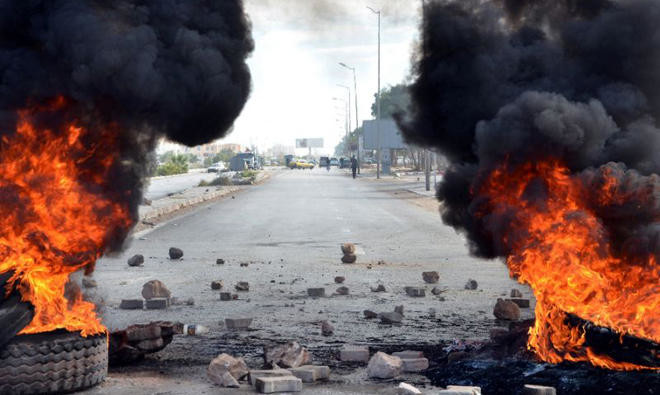
UN calls for $370m in new humanitarian aid for Lebanon

- Following nearly a year of exchanges of cross-border fire initiated by Hezbollah over the war in Gaza, Israel in September stepped up its bombing campaign and later sent troops into Lebanon
UNITED NATIONS, United States: The United Nations joined the Lebanese government on Tuesday to appeal for an additional $371.4 million in humanitarian aid for people displaced by the conflict between Israel and Hezbollah.
The extension builds on an initial aid appeal for $426 million launched in October, as all-out war flared between the two sides and sent hundreds of thousands in Lebanon fleeing their homes.
That appeal raised approximately $250 million, according to the UN.
Following nearly a year of exchanges of cross-border fire initiated by Hezbollah over the war in Gaza, Israel in September stepped up its bombing campaign and later sent troops into Lebanon.
After two months of warring, in which Hezbollah’s influential chief Hassan Nasrallah and multiple other leaders were killed, a ceasefire deal was reached that went into effect in late November.
“While the cessation of hostilities offers hope, over 125,000 people remain displaced, and hundreds of thousands more face immense challenges rebuilding their lives,” Imran Riza, the UN humanitarian coordinator in Lebanon, said in a statement Tuesday.
The additional funding “is urgently required to sustain life-saving efforts and prevent further deterioration of an already dire situation,” he added.
The appeal is primarily aimed to assist an estimated one million Lebanese, Syrian and Palestinian refugees affected by the conflict, funding a three-month period of emergency efforts through March 2025.
Since the ceasefire between Israel and Lebanon began on November 27, more than 800,000 displaced people in Lebanon have been able to return home, according to UN figures.
Qatar and Turkiye dispatch two power ships to generate electricity for Syria

- The vessels, which have power plants installed, are expected to increase the amount of electricity generated in the country by about 50 percent
- Syria’s energy infrastructure was badly damaged during the decade-long civil war, with most areas receiving power for only two or three hours a day
LONDON: Qatar and Turkiye sent two power-generating ships to Syria on Tuesday to help address the energy crisis in the country caused by insufficient electricity supplies.
Khaled Abu Di, the director of Syria’s Public Establishment for Transmission and Distribution of Electricity, said the floating power plants are capable of generating a total of 800 megawatts a day, which would increase the amount of electricity generated in the country by about 50 percent, state news agency SANA reported.
Syria’s energy infrastructure was badly damaged during more than a decade of civil war in the country that culminated in the fall of the ruling Assad regime in December. The deterioration resulted in severe power shortages, with many areas receiving electricity for only two or three hours a day.
Abu Di said efforts are underway to secure transmission lines to deliver the electricity generated by the ships. He added that his team is also working to repair dozens of damaged conversion plants and connection lines to get the national grid up and running again.
How Israeli law permitting child detention imperils the rights of Palestinian minors

- Under legislation passed in November by the Knesset, Israeli authorities are permitted to imprison Palestinians under the age of 14
- Rights monitors say Israel has detained some 460 children since the Oct. 7, 2023, Hamas-led attack triggered the Gaza war
DUBAI: Frightened, alone, and often injured during arrest, Palestinian children routinely find themselves vulnerable to abuses and deprived of basic rights after they are taken into Israeli custody, according to human rights monitors.
Under legislation passed in November by the Knesset, Israeli authorities are now permitted to detain Palestinians under the age of 14 — a measure that rights groups claim is motivated by revenge rather than security needs.
The bill, proposed by a member of Prime Minister Benjamin Netanyahu’s Likud party and approved by 53-33 votes, allows judges to sentence minors between the ages of 12 and 14 to prison terms if convicted of terrorist murder, manslaughter, or attempted murder.

According to the law, which was passed as a temporary measure lasting for five years, convicted minors can be held in closed facilities until they turn 14, after which they can be transferred to regular prisons.
An identical law, which was passed in 2016 following a series of attacks carried out by teenagers and other minors, expired in 2020.
According to the Palestinian Commission for Detainees and Ex-Detainees Affairs, Israel imprisoned more than 460 children between the months of October 2023 and January 2024.
INNUMBERS
460
Children imprisoned by Israel between October 2023 and January 2024, according to the Palestinian Commission for Detainees and Ex-Detainees Affairs.
16
Israeli courts have long defined the term ‘Palestinian child’ as a person under the age of 16, rather than the internationally recognized age of 18.
The Israeli parliament also passed a law in November that allows for the deportation of the family members of those convicted of attacks on Israeli citizens.
Furthermore, it allows for the deportation of the family members of those who had advance knowledge and either failed to report the matter to the police or “expressed support or identification with an act of terrorism.”

Relatives of those who published “praise, sympathy or encouragement for an act of terrorism or a terrorist organization” can also be deported.
“This is a historic and important day for all citizens of Israel,” Itamar Ben Gvir, Israel’s national security minister, said in a statement welcoming the bill, which he said “sends a clear message the State of Israel will not allow the families of the terrorists to continue enjoying life as if nothing had happened.
“From today onwards, every father, mother, child, brother, sister or spouse who identifies with and supports their family member who harmed the citizens of Israel will be deported.”

Both Israel’s Justice Ministry and the Attorney General’s Office raised concerns about the legislation, which stipulates that those being expelled would be sent to Gaza or other destinations for 7-15 years for citizens or 10-20 years for legal residents.
Some opposition members of the Knesset suggested at the time that the legislation is targeted specifically at Palestinian citizens of Israel, saying the law is unlikely to apply to Jewish Israelis convicted of terrorism offenses.
Israeli and Palestinian human rights organizations have branded both new laws unconstitutional.

Hadeel Abu Salih, an attorney working for Adalah, the Legal Center for Arab Minority Rights in Israel, sent a letter to the Israeli parliament claiming the legislation was motivated by revenge and retribution.
Abu Salih also said the legislation contradicts the principles of Israel’s Youth Law, which stresses rehabilitation over punitive measures for minors.
The Legal Center released a statement saying that “through these laws, Israel further entrenches its two-tiered legal system, with one set of laws for Jewish Israelis under criminal law and another, with inferior rights, for Palestinians under the pretext of counterterrorism.

“By embedding apartheid-like policies into the law, the Knesset further institutionalized systematic oppression, in contravention of both international law and basic human and constitutional rights.”
Since the Oct. 7, 2023, Hamas-led attack on southern Israel that triggered the Gaza war, Israeli forces have significantly increased the rate of arrests of Palestinian children, both in Gaza and the West Bank.
Between October and November 2023 alone, 254 minors were reportedly arrested by Israeli forces. Some of these detainees have since been released.

The bulk of the arrest operations appear to take place in towns, camps, and other areas with points of contact with Israeli checkpoints. Although the precise charges leveled against these minors are unknown, the most common offense is throwing stones.
In some cases, rights monitors say children under the age of 10 are taken in order to pressure their relatives to surrender themselves to Israeli authorities.
Palestinian children released from Israeli detention often describe traumatic experiences, recounting harsh measures enforced by guards and the prison administration, including allegations of physical and psychological torture during interrogation.

Testimonies shared with Save the Children include severe beatings in the presence of their relatives, being shot at, having their legs restrained, and being blindfolded during transfers between detention centers.
Several claim that food and water were also withheld for long periods of time as a form of punishment. Some have even alleged sexual abuse. Monitors say minors are routinely denied their right to legal aid and at times the presence of a family member during their interrogations.
As a result of these abuses, minors are allegedly coerced into signing false confessions and into signing documents without understanding their content. Children are also rarely granted bail before standing trial.
The Palestinian Commission for Detainees and Ex-Detainees Affairs and the Palestinian Prisoners Society have expressed concern about the ongoing detention of children and the alleged abuses.
Both say the behavior of Israeli prison administrations and conditions inside overcrowded facilities have become worse since the Oct. 7, 2023, attack.
Monitors say the detention centers holding minors do not meet the minimum humanitarian standards. A large number of detained children are reportedly sharing cells and are deprived of an education, medical assistance, and personal items such as books and clothing.
Israeli courts have long defined the term “Palestinian child” as a person under the age of 16, rather than the internationally recognized age of 18 as defined by the Convention on the Rights of the Child.
Israeli authorities have previously denied the maltreatment of detainees.
Responding to separate claims by the UN in March last year about the alleged mistreatment of adults captured in Gaza, the Israel Defense Forces told the BBC: “The mistreatment of detainees during their time in detention or whilst under interrogation violates IDF values and contravenes IDF and is therefore absolutely prohibited.”
Francesca Albanese, the UN special rapporteur for Palestine, accused the international community of failing to address the detention of Palestinian children, saying minors in Israeli custody are “tormented often beyond the breaking point.”
On World Children’s Day, marked by the UN on Nov. 20, the Palestinian Commission for Detainees and Ex-Detainees Affairs released a statement saying that around 270 Palestinian children were being held in Israeli jails.
“The occupation continues to detain no less than 270 children, who are mainly held in Ofer and Megiddo prisons, in addition to camps established by the occupation army after the Gaza war,” the commission said.
“Systematic crimes are being committed by the prison administration against the jailed children, in addition to beatings, torture, and daily abuses.”
According to Palestinian rights monitors, more than 11,700 people from the West Bank have been detained since October 2023. This does not include those from the Gaza Strip, where the number of arrests is thought to be far higher.
Similarly, the Ministry of Foreign Affairs of the Palestinian Authority urged the international community on World Children’s Day to pressure Israel to honor its commitments to global treaties, especially the Convention on the Rights of the Child.
It stressed the need to ensure Palestinian children are not excluded from international charters that call for special protections for children against violence and detention.
The ministry also condemned the law undertaken by the Knesset to detain children under the age of 14 years, calling it a dangerous escalation that further undermines Palestinian children’s rights.
Despite international and local human rights organizations calling for the abolition of the Knesset’s child detention laws, the Israeli government insists the law will remain in place for the next five years.

Germany pushing for EU to relax sanctions on Syria, sources say

- This requires an unanimous EU decision
- Germany’s foreign ministry declined to comment
BERLIN: Germany is leading European Union discussions on easing sanctions imposed on the Syrian government of toppled President Bashar Assad and aiding the country’s population, foreign ministry sources said on Tuesday.
“We are actively discussing ways to provide sanctions relief to the Syrian people in certain sectors,” one of the sources said. This requires an unanimous EU decision.
Germany’s foreign ministry declined to comment.
A lightning rebel offensive overthrew Assad on Dec. 8 and Islamist rebels Hayat Tahrir Al-Sham (HTS), which led the advance, set up a caretaker government.
The US on Monday issued a six-month sanctions exemption for transactions with some government bodies to ease the flow of humanitarian assistance, address Syria’s power shortages and allow personal remittances.
The EU, United States, Britain and other governments imposed tough sanctions on Syria after Assad’s crackdown on pro-democracy protests in 2011 spiraled into civil war.
HTS has renounced its ties with Al Qaeda but is still designated a terrorist entity by the United Nations and US
German officials first circulated thoughts on easing sanctions on Syria in documents sent to Brussels before Christmas.
The FT first reported on Tuesday that the documents outline how the EU could gradually ease restrictions on Damascus in return for progress on social issues, including safeguarding minority and women’s rights and upholding commitments to ensuring non-proliferation of weapons.
The FT, citing an unnamed source familiar with the EU discussions, added that, like Washington, the bloc could make any easing of sanctions temporary to ensure that it could be reversed if necessary.
German Foreign Minister Annalena Baerbock on Friday traveled to Syria for a one-day trip with her French counterpart on behalf of the EU and met with HTS leader Ahmed Al-Sharaa.
Baerbock said during her visit that all Syrian groups including women and Kurds must be involved in the country’s transition if Damascus wants European support.
Gaza officials say children killed as Israel hits Khan Yunis

- Four children were killed when a drone strike hit their tent in the Al-Mawasi area
- Two people were killed when a strike hit a car in Khan Yunis
GAZA STRIP, Palestinian Territories: Gaza health officials said a wave of Israeli strikes hit the territory’s southern district of Khan Yunis on Tuesday evening, killing a dozen people, seven of them children.
At least five strikes targeted parts of Khan Yunis, including one in the Al-Mawasi area where thousands of displaced Palestinians are living in tents along the coast.
Four children were killed when a drone strike hit their tent in the Al-Mawasi area, the Hamas-run territory’s health ministry reported.
A witness told AFP that several tents caught fire from the strike, which also wounded more than 20 people.
Five people, including three children, were killed and several wounded in a strike on a house in Khan Yunis, Gaza’s civil defense agency said.
Two people were killed when a strike hit a car in Khan Yunis, while another two were killed when an apartment was hit.
There was no immediate comment from the military about the latest strikes.
They came as mediators Qatar, Egypt and the United States brokered negotiations between Israel and Hamas in Doha on a deal to end the fighting in Gaza and secure the release of Israeli hostages.
In recent months, the Israeli military has focused its offensive on northern districts of Gaza, particularly the town of Jabalia and its adjacent refugee camp.
“We won’t stop. We will bring them (Hamas) to the point where they understand that they must return all hostages,” Israel’s army chief Lt. Gen. Herzi Halevi told troops during a visit to Jabalia late on Monday.
“They see, every single day, what you are doing to them, and they understand that this is becoming unbearable,” he said, according to a statement released by the military.
During their October 7, 2023 attack, which sparked the war, Palestinian militants seized 251 hostages, of whom 96 remain in Gaza. The Israeli military says 34 of those are dead.
The attack resulted in the deaths of 1,208 people on Israeli side, mostly civilians, according to Israeli official figures.
Israel’s retaliatory offensive has killed 45,885 people in Gaza, a majority of them civilians, according to figures from the Hamas-run territory’s health ministry that the United Nations considers reliable.


